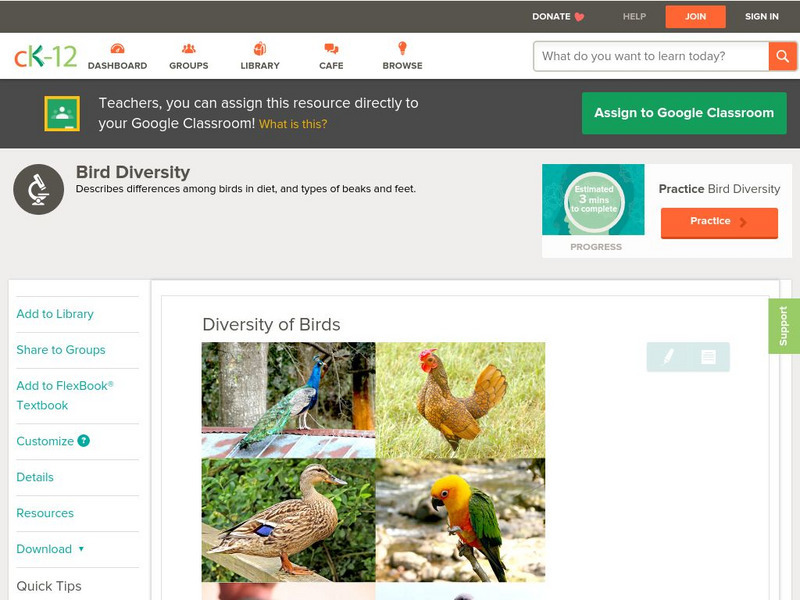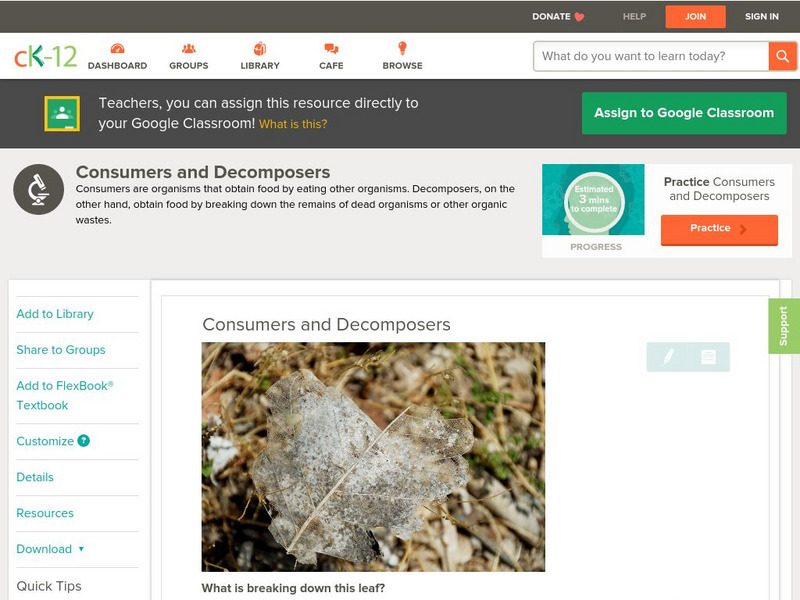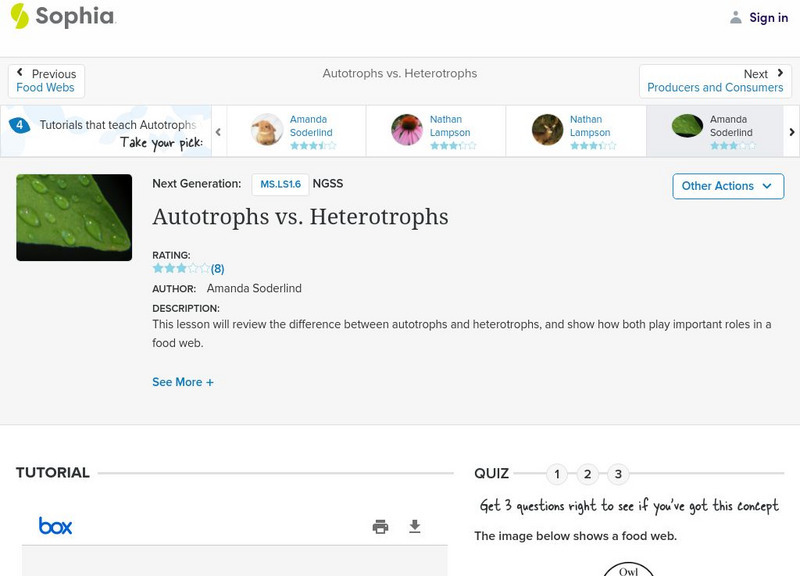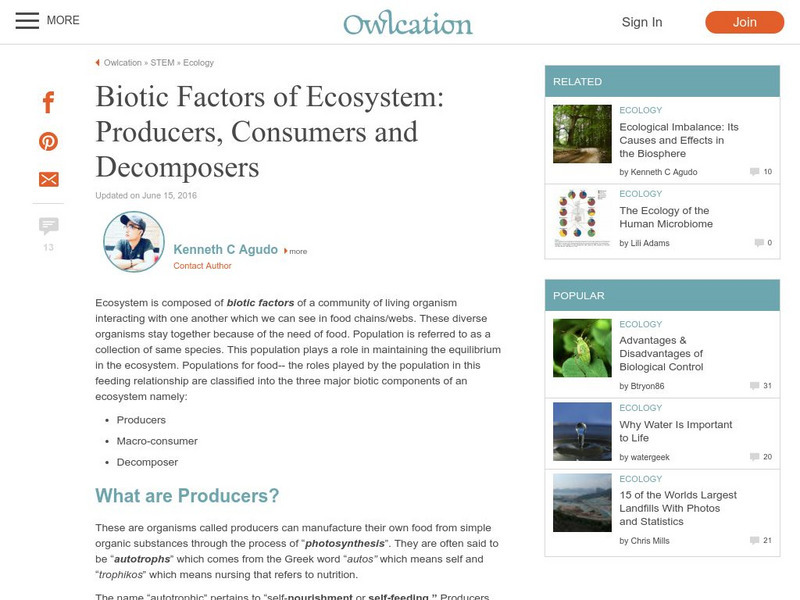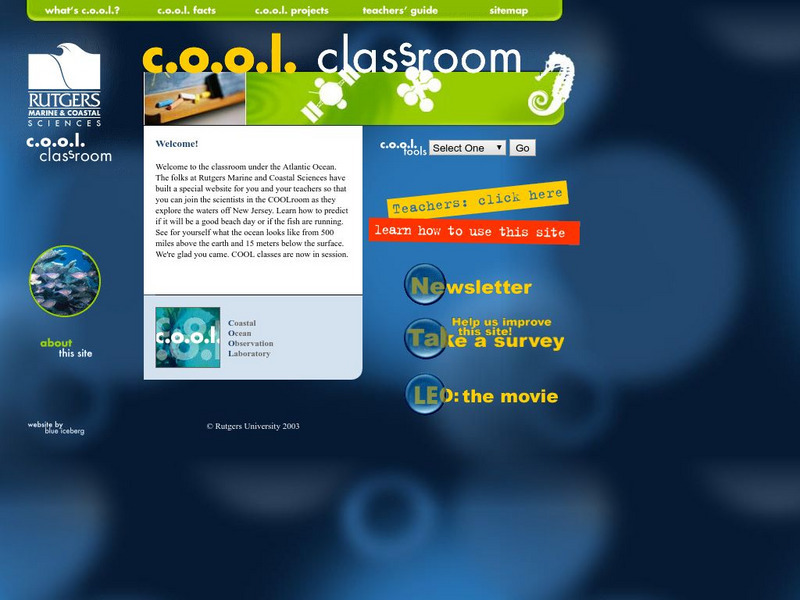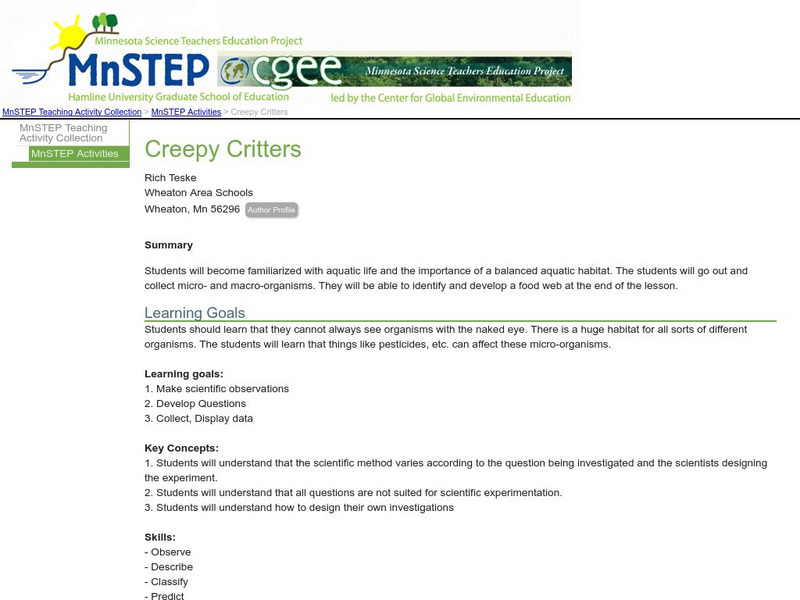Science Struck
Science Struck: Decomposers in the Ocean: Role and Examples
Describes five different types of decomposers that feed on decaying organic matter in the oceans and that are at the bottom of the ocean food chain.
BiologyWise
Biology Wise: Understanding the Process of Biological Magnification
Biological magnification is the term used to described the increasing accumulation of substances in organisms as one looks at higher trophic levels in a food chain. When that substance is a toxin, such as a heavy metal or a pesticide,...
Planet Pals
Planet Pals: Producers
This colorful site examines the food chain and delves into an explanation of what producers are and where they fit in an overall ecosystem.
ClassFlow
Class Flow: Habitats
[Free Registration/Login Required] A 2nd grade unit on animal environments and habitats. Include web links for information on different land and water habitats, as well as a lesson on food chains.
CK-12 Foundation
Ck 12: Life Science: Diversity of Birds
[Free Registration/Login may be required to access all resource tools.] About 10,000 bird species belong to 29 different orders within the class Aves. The diversity among birds is striking. Birds can vary greatly in size and color. Some...
Mocomi & Anibrain Digital Technologies
Mocomi: What Is an Ecosystem?
Learn about ecosystems, how they work, codependency, and food chains.
CK-12 Foundation
Ck 12: Life Science: Consumers and Decomposers
[Free Registration/Login may be required to access all resource tools.] Producers make their own food through photosynthesis. But many organisms are not producers and cannot make their own food, but must get their energy from other...
Sophia Learning
Sophia: Autotrophs vs. Heterotrophs: Lesson 2
This lesson will review the difference between autotrophs and heterotrophs, and show how both play important roles in a food web. It is 2 of 4 in the series titled "Autotrophs vs. Heterotrophs."
PBS
Pbs: Nature: The Fascinating World of Jellies
Learn about the mysterious jellyfish blooms that have occurred in the world's oceans. Because the resulting alteration to the marine food web has had devastating effects, researchers grow and study jellyfish at the Monterey aquarium....
PBS
Pbs Teachers: Predator Protector Game Lesson
Describe the habitat, food web and ecosystem of shark species. Identify threats to sharks and explore how top predators help to maintain the balance of nature within ecosystems. This lesson plan also contains an interactive game.
FT Exploring
Ft Exploring: The Flow of Energy Through Plants and Animals
Explore the different ecological roles of organisms in the ecosystem, and find out how the energy flows through them.
TeachEngineering
Teach Engineering: Biodomes
Students explore the biosphere's environments and ecosystems, learning along the way about the plants, animals, resources and natural cycles of our planet. Over the course of lessons 2-6, students use their growing understanding of...
Other
Hub Pages: Biotic Factors of Ecosystem: Producers, Consumers and Decomposers
An ecosystem is composed of biotic factors of a community of living organisms interacting with one another which we can see in food chains/webs. These diverse organisms stay together because of the need of food. Population is referred to...
Other
Rutgers Marine & Coastal Sciences: Cool Classroom
Students and teachers can explore the work of marine scientists and observe the ocean from their computers. Learn about Rutgers Coastal Ocean Observation Laboratory, discover why oceanography is important, and see what life is like in...
Science Education Resource Center at Carleton College
Serc: Creepy Critters
Young scholars learn about aquatic life and the importance of a balanced aquatic habitat by collecting micro- and macro-organisms. By the end of the lesson, they will be able to identify and develop a pond food web.
Sophia Learning
Sophia: Producers and Consumers: Lesson 3
This lesson will review the difference between producers and consumers, and show how both play important roles in a food web. It is 3 of 4 in the series titled "Producers and Consumers."
Sophia Learning
Sophia: Producers and Consumers: Lesson 4
This lesson will review the difference between producers and consumers, and show how both play important roles in a food web. It is 4 of 4 in the series titled "Producers and Consumers."
Sophia Learning
Sophia: Producers and Consumers: Lesson 2
This lesson will review the difference between producers and consumers, and show how both play important roles in a food web. It is 2 of 4 in the series titled "Producers and Consumers."
Sophia Learning
Sophia: Autotrophs vs. Heterotrophs: Lesson 3
This lesson will review the difference between autotrophs and heterotrophs, and show how both play important roles in a food web. It is 3 of 4 in the series titled "Autotrophs vs. Heterotrophs."
Shmoop University
Shmoop: Ecosystem Energy Flow
Explains the processes by which energy flows through an ecosystem. Covers the meanings of key vocabulary, e.g., types of producers and consumers, trophic levels, food webs, and the energy pyramid.
CK-12 Foundation
Ck 12: Episd: Energy Pyramids
[Free Registration/Login may be required to access all resource tools.] Understand how energy flows within ecosystems through the use of energy pyramids.
CK-12 Foundation
Ck 12: Episd: Consumers and Decomposers
[Free Registration/Login may be required to access all resource tools.] Based upon the way organisms acquire their energy students will understand how to group them as consumers, decomposers or producers.
Other
Kidwings: Virtual Owl Pellet Dissection
A complete lesson on owl pellets. Students can read information, watch a tutorial, and use their computer mouse to complete a dissection simulation right there on the screen.
Georgia Department of Education
Ga Virtual Learning: Ecosystems
This module offers an in depth study of the fundamental components of ecosystems. Activities include mini-lessons with videos and student assignments.
Other popular searches
- Food Web Chain
- Food Webs and Chains
- Ecology Food Webs Chains
- Food Webs and Food Chains
- Food Web Food Chain
- Food Web and Food Chains
- Ocean Food Chains and Webs
- Create Food Chain Web
- Food Web/food Chains
- Food Web and Chains
- Food Webs Chains
- Food Webs Food Chains





